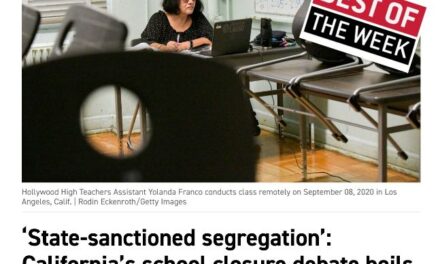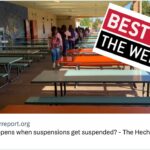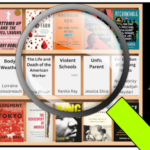On Monday, it was announced that Campbell Brown’s The Seventy Four news outlet/advocacy effort and Jamie Lynton’s LA School Report (which I used to run) were merging.
The two publishers praised the move, while critics and reporters noted concerns about the editorial slant of The Seventy Four and the possible impact on LA schools.
But nobody seems to have taken on the question of whether the move makes sense for the Seventy Four — or whether LA still needs the targeted coverage that the LA School Report was once the only site to provide. And what about the LA Times’ coverage of what is essential a competitor to its own education coverage?
Concerns and questions dominated the initial coverage of the move.
Described in the press announcement as a new partnership, the reorganization was better described as a takeover by of LASR, according to the LA Times’ Howard Blume: “The Seventy Four, a news site [Brown] co-founded, now controls LA School Report, a website that covers schools in Los Angeles.”
According to Blume’s story, “The group’s entry into Los Angeles has alarmed union leaders and some supporters of traditional public education. They say it could undermine trust in the reporting of education controversies.”
In particular, charter critics in LA are worried about the impact of The Seventy Four’s arrival on the delicate and controversial issue of expanding charter school options for LAUSD parents: “Is there a connection between the Seventy Four’s takeover of LA School Report and the Broad-Walmart plan to privatize LAUSD schools? Of course there is,” said UTLA president Alex Caputo-Pearl in the LA Times piece.
The LA Times is also funded in part by the Broad Foundation, which is not indicated until the bottom of Blume’s piece.
In response to criticism of The Seventy Four in the LA Times story, Brown tweeted that Zimmer was simply expressing “anger over being covered by actual reporters.”
LAUSD school board member @lausd_zimmer expresses anger over being covered by actual reporters #parody @howardblumehttps://t.co/jP3Dkcohql
— Campbell Brown (@campbell_brown) February 2, 2016
Mark Walsh in Education Week (which also receives some funding from the Walton Family Foundation), noted that The Seventy Four has “brought something of an ideological bent to its coverage.”
A Diane Ravitch post titled Campbell Brown Takes Charge of Editorial Content at LA School Report, echoed many of the same concerns reported in the LA Times story.
Coverage of the merger also revealed that critics have become much more comfortable with LA School report coverage – and remained much less so with the approach to education news exhibited by The Seventy Four.
The latest change represents a third major staffing shift for LA School Report, which was launched under my supervision and the daily reporting of Hillel Aron (now at LA Weekly). A year later, Michael Janofsky was installed as editor, and Vanessa Romo (now a Spencer Fellow) took over lead reporting duties.
According to emails posted by Ravitch, LAUSD Board Member Steve Zimmer asked Janofsky to consider staying on to run LASR.
However, left out of the LA Times story (and the EdWeek coverage that followed) is that the LA Times and LA School Report are competitors on education and that at least occasionally LA School Report was critical of the coverage the LA Times was giving to LAUSD education issues. Shouldn’t this have been acknowledged? I’m also somewhat curious about why the LA Times piece was assigned to education reporter Blume rather than a media reporter or critic.
Also missing from both pieces about the merger was any real analysis of whether the takeover makes sense, journalistically or financially.
To be sure, publishers Lynton and Brown share a journalistic background and an impatient advocate approach to education issues. Neither adheres to the balanced/objective model of journalism that sometimes results in the traditional “he said/she said” approach to story selection and news coverage.
Logistically, it also makes sense. Lynton and her family have reportedly moved to New York City, and Lynton was bankrolling the site on her own. With an annual budget reported at $4 million, The Seventy Four is supported by the Walton Family Foundation, the Doris & Donald Fisher Fund and Bloomberg Philanthropies (two of whom also help fund this site).
However, I’m not as clear how taking on a West Coast bureau fits into The Seventy Four’s larger plans or fills an appetite from readers.
National interest in Los Angeles is notoriously thin, despite the city’s importance.
Once lacking in education coverage, the city now has two of the biggest local education news teams in the nation (KPCC and LA Times). There are other cities — Washington DC comes to mind — where additional news coverage is more obviously needed.
Both sites have struggled to gain traction and attention outside the confines of the never-ending education debate. And in an extremely crowded education news environment, the Seventy Four doesn’t seem to have generated regular attention from mainstream media outlets, in terms of breaking news or winning exclusives that other outlets have to follow.
It should be noted at this point that although we have worked together and share some of the same funders, I have had public run-ins with both publishers. Lynton and I parted ways after the first year of LA School Report when she decided to hand the site over to Janofsky (who is being replaced by a former LA Times editor). Though at one point we talked about working together, Brown objected strenuously to a story I wrote on this site not too long ago about how her site was not well-positioned to engage in media criticism.
So perhaps I’m seeing this all wrong. “Los Angeles is a national education story and should be front page everyday,” says co-founder Romy Drucker. There’s so much happening here in the second largest school district in the country – with a new superintendent on board and lots of enthusiasm from parents, educators, community groups, and politicians who want better schools for all children.” Asked about the other news outlets already covering education, Drucker noted that LA School Report is the only education-only outlet among them.
The Seventy Four has partnered with The Atlantic’s education page. They also work regularly with Huffington Post and The Daily Beast, and have been picked up sites including Time, Business Insider, and People. Drucker says that stories that have resonated with readers include one-on-one interviews with Republican presidential candidates, a profile of a 102-year old teacher in North Plainfield, New Jersey, and Richard Whitmire’s take on the impressive achievement gains of Newark’s public charter school students. and a close look at “the forgotten children of California’s drought.”
The site also was first to feature former Newark superintendent Cami Anderson’s reflections on her tenure, and has included several thought-provoking pieces by Matt Barnum.
Related posts: About The Washington Post’s Campbell Brown Story;Nieman Journalism Lab Takes a Deeper Look at The Seventy Four; Unsolicited Advice On The Launch Of “The Seventy-Four; Former CNN Host Unveils Education News Site To Mixed Reactions; Colbert Interviews Campbell Brown; Campbell Brown Vs. Matt Damon; The Sony WikiLeaks Hack Gets an Education Angle — Sorta.
ABOUT THE AUTHOR

Alexander Russo
Alexander Russo is founder and editor of The Grade, an award-winning effort to help improve media coverage of education issues. He’s also a Spencer Education Journalism Fellowship winner and a book author. You can reach him at @alexanderrusso.
Visit their website at: https://the-grade.org/











